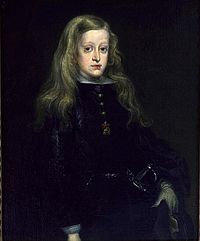Marie Thérèse, Madame Royale
| Marie Thérèse | |||||
|---|---|---|---|---|---|
| Madame Royale | |||||
 Portrait c. 1671[1] | |||||
| Born | 2 January 1667 Château de Saint-Germain-en-Laye, France | ||||
| Died | 1 March 1672 (aged 5) Château de Saint-Germain-en-Laye, France | ||||
| Burial | Royal Basilica, Saint Denis, France | ||||
| |||||
| House | Bourbon | ||||
| Father | Louis XIV of France | ||||
| Mother | Maria Theresa of Spain | ||||
Marie Thérèse (2 January 1667 – 1 March 1672) was the fourth child and only legitimate surviving daughter of King Louis XIV of France and his wife; Maria Theresa of Spain. As the daughter of a reigning French Monarch, she was Fille de France and was known at court by the traditional honorific style of Madame Royale. She died at the age of five to tuberculosis.[2]
Early life
[edit]Marie Thérèse was born on 2 January 1667 at the Château de Saint-Germain-en-Laye. She had two elder sisters, but they both died during infancy. Upon her parents' request, the following year after her birth, they had her baptised promptly alongside her godfather; Henri Jules, Prince of Condé and her paternal aunt; Margaret of Lorraine. This took place at the Palais du Louvre in 1668.

Her parents reputedly adored and loved the young child. Her mother wanted her to become the queen of Spain and it was proposed via Charles II, the heir presumptive to the Spanish Throne.[3] As a Fille de France, Marie Thérèse was entitled by law to the style of Her Royal Highness, but was referred to simply as '"Madame Royale". As governess, Marie Thérèse was appointed and placed under the care of Louise de Prie.[4]
Marie Thérèse was also known by "La Petite Madame" to distinguish her from her aunts, the wives of her uncle Philippe I, Duke of Orléans, who were known as Madame Henrietta of England (1664–1670) and the second Elisabeth Charlotte, Madame Palatine (1652–1722).
Death
[edit]On the night of 1 March 1676, around 10 o'clock in the evening, her mother found Marie Thérèse covered in sweat. She watched as Marie Thérèse struggled to utter the words "Maman... peux plus..."[5] Shortly afterwards she succumbed to tuberculosis at the Château de Saint-Germain-en-Laye. Marie Thérèse was buried at the Royal Basilica of Saint Denis, outside Paris, France. The music for the funeral ceremony was composed by musician; Marc-Antoine Charpentier (H.409, H.189, H.331).
Ancestry
[edit]Patrilineal descent
[edit]| Patrilineal descent |
|---|
|
Patrilineal descent is the principle behind membership in royal houses, as it can be traced back through the generations - which means that if Princess Marie Thérèse were to choose an historically accurate house name it would be Robertian, as all her male-line ancestors have been of that house. Marie Thérèse is a member of the House of Bourbon, a branch of the Capetian dynasty and of the Robertians. Marie Thérèse's patriline is the line from which she is descended father to son. It follows the Dukes of Parma as well as the Kings of Spain, France, and Navarre. The line can be traced back more than 1,200 years to the present day and is one of the oldest in Europe.
|


References
[edit]- ^ "Marie Thérèse of France". museodelprado.es/en.
- ^ "Marie-Thérèse (Bourbon) de France (1667 - 1672)". www.wikitree.com (in French). Retrieved 22 January 2017.
Elle meurt à l'âge de cinq ans des suites d'une tuberculose, le 1er mars 1672, à Saint-Germain-en-Laye.
- ^ Langdon-Davies, John (1963). Carlos: The King Who Would Not Die. Englewood Cliffs, N.J.: Prentice Hall. pp. 88–89.
- ^ "Marie-Thérèse de France, Madame Royale". partylike1660.com. 11 October 2024.
Louise de Prie, Marquise de Toucy, was appointed as the governess of Madame Royale shortly after her birth and only a couple of months later, the little girl fell ill with smallpox. Mama Marie-Thérèse was in great alarm. She already had lost two girls, Anne-Élisabeth and Marie-Anne, in infancy.
- ^ "Marie-Thérèse de France, Madame Royale". partylike1660.com. 11 October 2024.
Marie-Thérèse fell ill again. On the night of March 1 in 1672, around 10 o'clock in the evening, her mother found the little girl covered all over in sweat. She died shortly later. "Maman… peux plus…" were the last words that came from the round lips of the little princesse.
- ^ a b c d e f g h i j Anselm de Guibours (1726). Histoire généalogique et chronologique de la maison royale de France [Genealogical and chronological history of the royal house of France] (in French). Vol. 1 (3rd ed.). Paris: La compagnie des libraires.
- ^ a b Wurzbach, Constantin von, ed. (1860). . Biographisches Lexikon des Kaiserthums Oesterreich [Biographical Encyclopedia of the Austrian Empire] (in German). Vol. 6. p. 152 – via Wikisource.
- ^ a b Chisholm, Hugh, ed. (1911). . Encyclopædia Britannica. Vol. 21 (11th ed.). Cambridge University Press.
- ^ a b Leonie Frieda (14 March 2006). Catherine de Medici: Renaissance Queen of France. HarperCollins. p. 386. ISBN 978-0-06-074493-9. Retrieved 21 February 2011.
- ^ a b Chisholm, Hugh, ed. (1911). . Encyclopædia Britannica. Vol. 21 (11th ed.). Cambridge University Press.
- ^ a b Wurzbach, Constantin von, ed. (1861). . Biographisches Lexikon des Kaiserthums Oesterreich [Biographical Encyclopedia of the Austrian Empire] (in German). Vol. 7. p. 13 – via Wikisource.
- ^ Nocret, Jean (1670-01-01), English: Marie Therese of France, Petit Madame. (detail of "Louis XIV and His Family"), retrieved 2017-04-19
